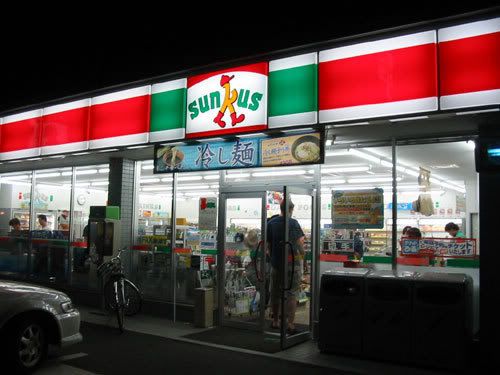
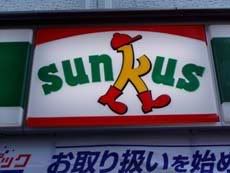
This is one of the major convienence stores, or "conbenies" as they are commonly known around J-land. I have always been a bit puzzled by this name, as it seems to be a bit gibberishey. At first, I figured that they were promoting the freshness of their goods, and assumed that Sun-Kus was a
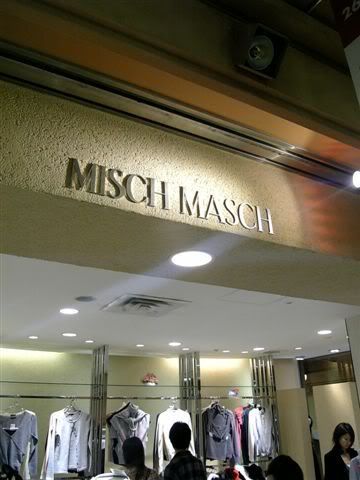
of "Sun Kiss". See, that's pretty close... just switch the u for an i, and drop an s.... makes sense, right?
Then someone told me that the "K" was actually an "R". Er... Sun Rus? Sun Rust? ... ermm....
Sun Rise?
maybe.
Now, the difficulties that the Japanese have with the letter "R" are well known. One of my former students used to interchangably spell her name "Lina" and "Rina". When I asked my Japanese co-worker to clarify what her actual name was, she responded with "Both. To us, they're the same." So, I was understandably concerned that they decided to make the "R" super jumbo size.
Still...I started pondering what things would be like with "Sun Lus"
Sun Less?
...naw... too negative.
Son Lust?
I bloody hope not.
Sun Lust?
Hrmm... maybe.... but still a bit dirty.
So, I just let it go until today...when finally the the mystery was explained!
Ready?
It's supposed to day "Thanks".
Readers: WHAAAAA????
Yeah... I felt that way too, so I know what you're thinking. But seriously, when the word "Thanks" is changed to Japanese syllabary, it becomes ”スンクス" (sunkusu). This happens because some key sounds are missing. There's no "Th" sound in Japanese, so they use "Su" (like "suh"). N is ok, but since all consonents other than "n" are followed by a vowel sound, you have to have "ku" instead of "k". At the end of the word, the Japanese sometimes barely pronounce the last vowel sound. So there you have it.
Su n ku s(u).
But I still have no idea why they didn't just use "Domo" or "Arigato", which are the Japanese words for "Thanks." I can understand not wanting to call it "Ari G" for fear of mixing things up with the Sasha Baron Cohen character, but they totally could have used Domo.
English Help:
1) Sorry for the L/R comments. I know that the corresponding sound in Japanese is halfway between the English L and R. Trust me, I have been trying to get my head around particles, and they totally kick my ass. Ga? Wo? What? So we're even, ok?
2) gibberishey: This isn't a real word. "Gibberish" means "nonsense". Adding "y" or "ey" to a noun can make it an adjective. eg, "Gooey" or "messy"
3) Mish Mash - this is like a blending or mix up. Think "mashed potatoes".
4) Lust - means desire, specifically sexual desire. I don't think this is such a good word to use in a name for a company that competes with "Family Mart".
5) Sasha Baron Cohen is a comedian who has a character named "Ali G". He also just released a big movie called "Borat".


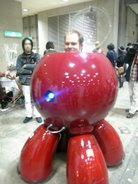
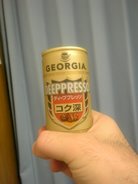
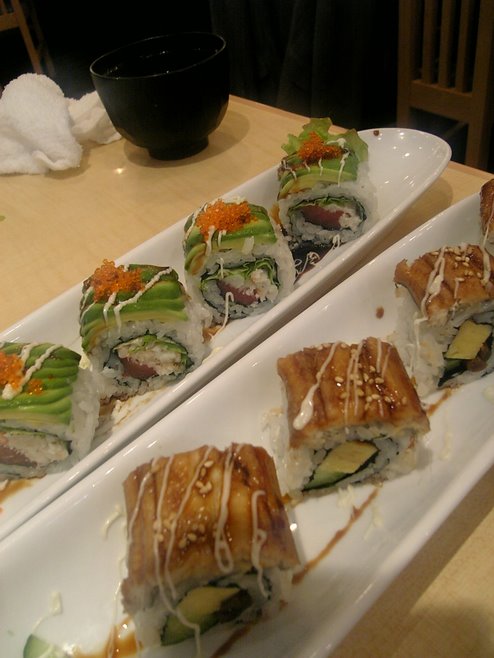

No comments:
Post a Comment